Ethics for Managers: FMCG Sectors' Role in SDGs and Development
VerifiedAdded on 2023/06/09
|9
|2298
|280
Report
AI Summary
This report, titled "Ethics for Managers," delves into the ethical responsibilities of the Fast-Moving Consumer Goods (FMCG) sector, particularly in relation to Sustainable Development Goals (SDGs). The report examines three key SDGs: poverty eradication, ensuring quality food supply, and promoting healthy lives. It analyzes strategies FMCG companies can employ to contribute to these goals, including stakeholder involvement, collaboration with farmers, workplace improvements, and partnerships with organizations like Oxfam and the World Health Organization. The report highlights examples of successful initiatives by companies like Starbucks, Coca-Cola, Cargill, and Levi Strauss & Co., demonstrating how ethical practices and sustainable development can be integrated for societal and business success. The conclusion emphasizes the importance of these strategies as benchmarks for the development of the FMCG sectors.

Running head: ETHICS FOR MANAGERS
Ethics for Managers
Name of Student
Name of University
Author Note
Ethics for Managers
Name of Student
Name of University
Author Note
Paraphrase This Document
Need a fresh take? Get an instant paraphrase of this document with our AI Paraphraser
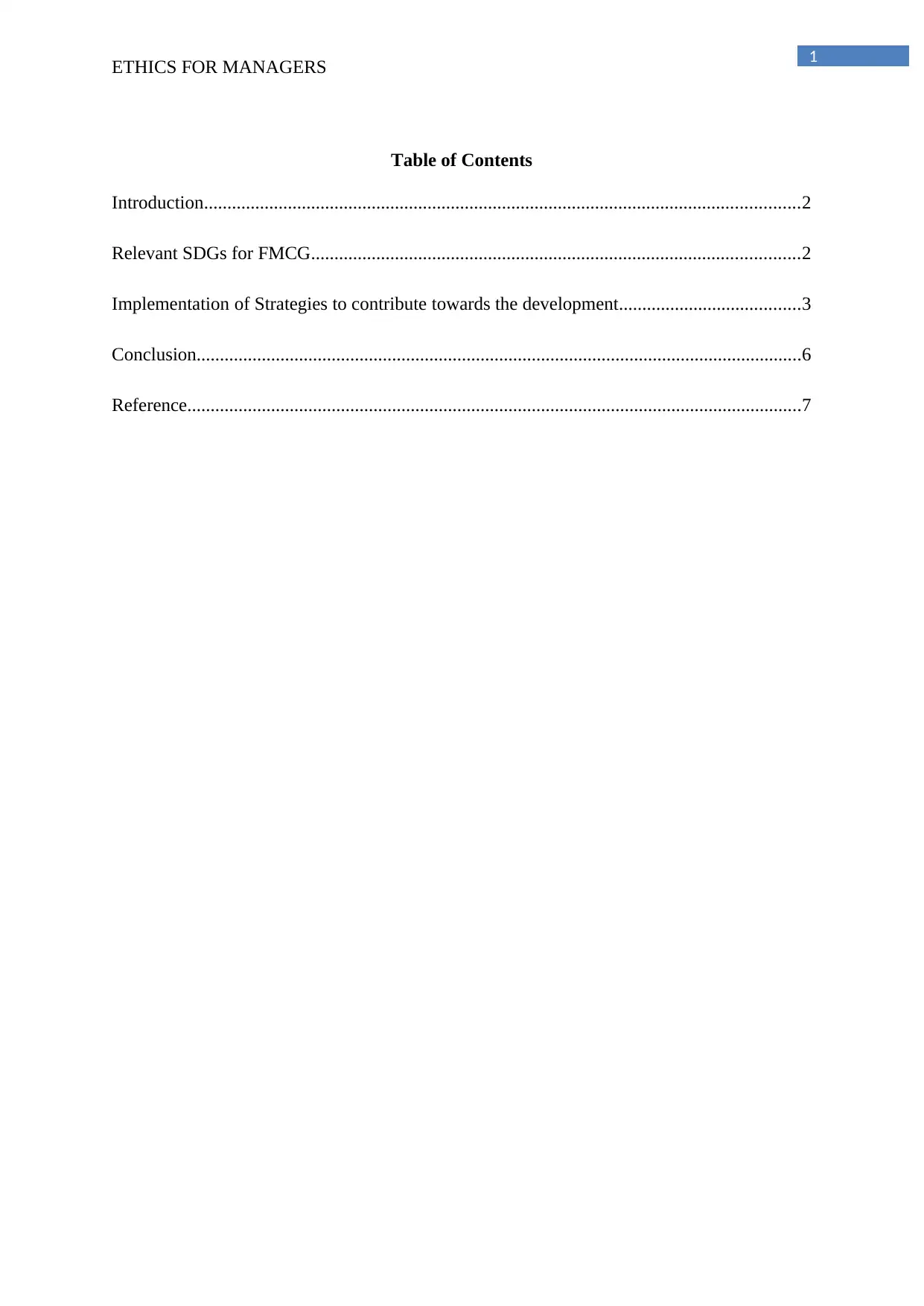
1
ETHICS FOR MANAGERS
Table of Contents
Introduction................................................................................................................................2
Relevant SDGs for FMCG.........................................................................................................2
Implementation of Strategies to contribute towards the development.......................................3
Conclusion..................................................................................................................................6
Reference....................................................................................................................................7
ETHICS FOR MANAGERS
Table of Contents
Introduction................................................................................................................................2
Relevant SDGs for FMCG.........................................................................................................2
Implementation of Strategies to contribute towards the development.......................................3
Conclusion..................................................................................................................................6
Reference....................................................................................................................................7
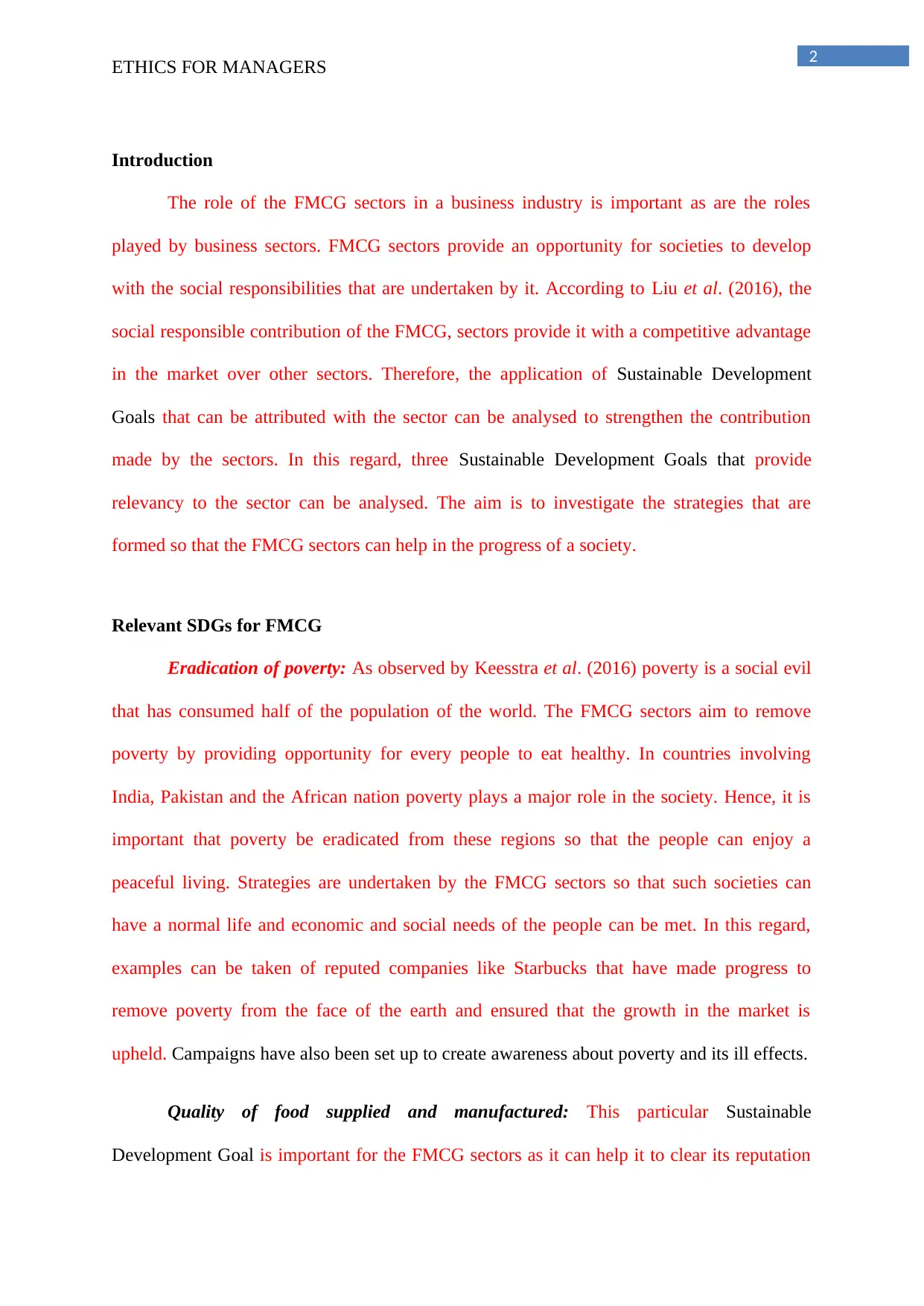
2
ETHICS FOR MANAGERS
Introduction
The role of the FMCG sectors in a business industry is important as are the roles
played by business sectors. FMCG sectors provide an opportunity for societies to develop
with the social responsibilities that are undertaken by it. According to Liu et al. (2016), the
social responsible contribution of the FMCG, sectors provide it with a competitive advantage
in the market over other sectors. Therefore, the application of Sustainable Development
Goals that can be attributed with the sector can be analysed to strengthen the contribution
made by the sectors. In this regard, three Sustainable Development Goals that provide
relevancy to the sector can be analysed. The aim is to investigate the strategies that are
formed so that the FMCG sectors can help in the progress of a society.
Relevant SDGs for FMCG
Eradication of poverty: As observed by Keesstra et al. (2016) poverty is a social evil
that has consumed half of the population of the world. The FMCG sectors aim to remove
poverty by providing opportunity for every people to eat healthy. In countries involving
India, Pakistan and the African nation poverty plays a major role in the society. Hence, it is
important that poverty be eradicated from these regions so that the people can enjoy a
peaceful living. Strategies are undertaken by the FMCG sectors so that such societies can
have a normal life and economic and social needs of the people can be met. In this regard,
examples can be taken of reputed companies like Starbucks that have made progress to
remove poverty from the face of the earth and ensured that the growth in the market is
upheld. Campaigns have also been set up to create awareness about poverty and its ill effects.
Quality of food supplied and manufactured: This particular Sustainable
Development Goal is important for the FMCG sectors as it can help it to clear its reputation
ETHICS FOR MANAGERS
Introduction
The role of the FMCG sectors in a business industry is important as are the roles
played by business sectors. FMCG sectors provide an opportunity for societies to develop
with the social responsibilities that are undertaken by it. According to Liu et al. (2016), the
social responsible contribution of the FMCG, sectors provide it with a competitive advantage
in the market over other sectors. Therefore, the application of Sustainable Development
Goals that can be attributed with the sector can be analysed to strengthen the contribution
made by the sectors. In this regard, three Sustainable Development Goals that provide
relevancy to the sector can be analysed. The aim is to investigate the strategies that are
formed so that the FMCG sectors can help in the progress of a society.
Relevant SDGs for FMCG
Eradication of poverty: As observed by Keesstra et al. (2016) poverty is a social evil
that has consumed half of the population of the world. The FMCG sectors aim to remove
poverty by providing opportunity for every people to eat healthy. In countries involving
India, Pakistan and the African nation poverty plays a major role in the society. Hence, it is
important that poverty be eradicated from these regions so that the people can enjoy a
peaceful living. Strategies are undertaken by the FMCG sectors so that such societies can
have a normal life and economic and social needs of the people can be met. In this regard,
examples can be taken of reputed companies like Starbucks that have made progress to
remove poverty from the face of the earth and ensured that the growth in the market is
upheld. Campaigns have also been set up to create awareness about poverty and its ill effects.
Quality of food supplied and manufactured: This particular Sustainable
Development Goal is important for the FMCG sectors as it can help it to clear its reputation
⊘ This is a preview!⊘
Do you want full access?
Subscribe today to unlock all pages.

Trusted by 1+ million students worldwide
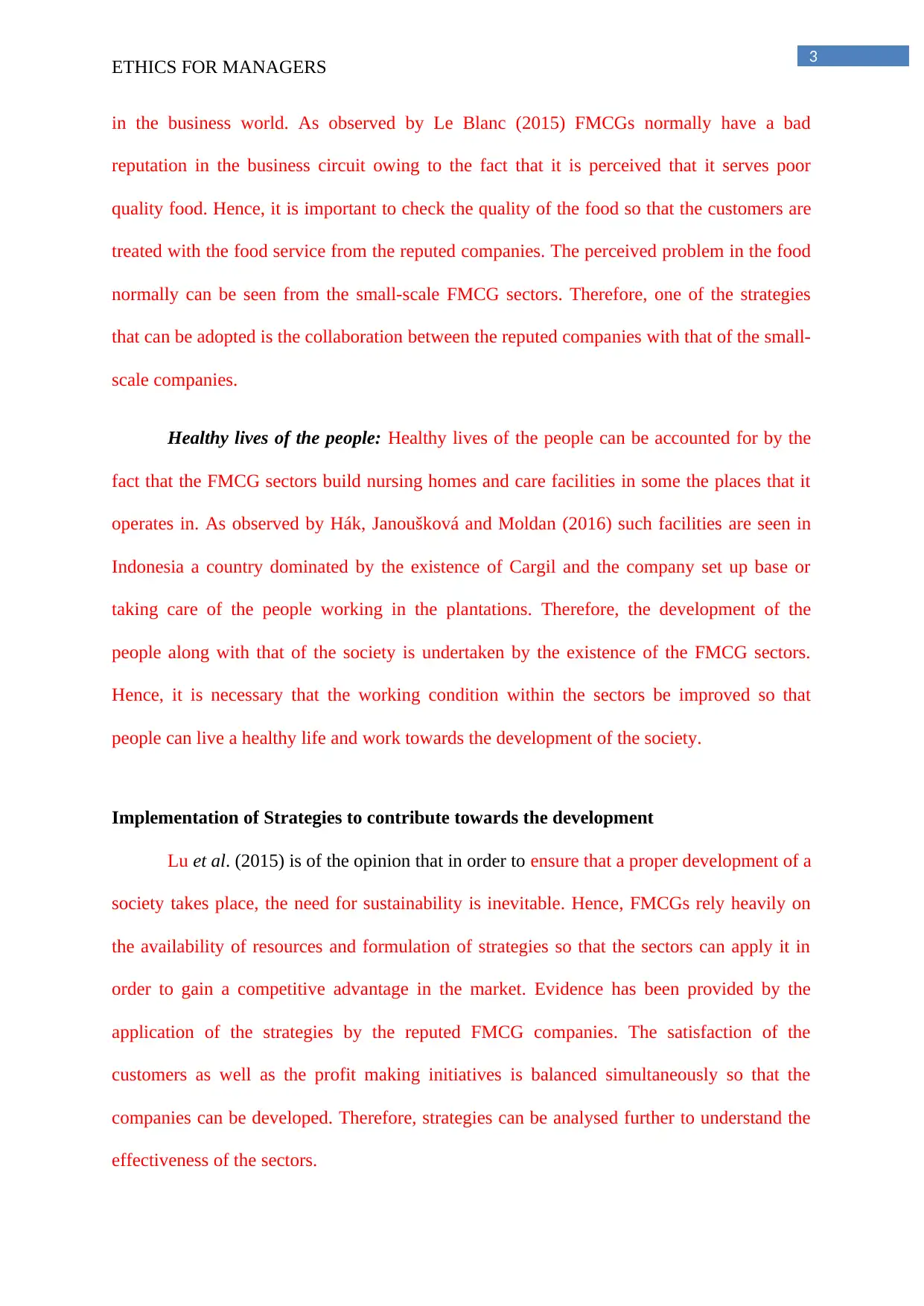
3
ETHICS FOR MANAGERS
in the business world. As observed by Le Blanc (2015) FMCGs normally have a bad
reputation in the business circuit owing to the fact that it is perceived that it serves poor
quality food. Hence, it is important to check the quality of the food so that the customers are
treated with the food service from the reputed companies. The perceived problem in the food
normally can be seen from the small-scale FMCG sectors. Therefore, one of the strategies
that can be adopted is the collaboration between the reputed companies with that of the small-
scale companies.
Healthy lives of the people: Healthy lives of the people can be accounted for by the
fact that the FMCG sectors build nursing homes and care facilities in some the places that it
operates in. As observed by Hák, Janoušková and Moldan (2016) such facilities are seen in
Indonesia a country dominated by the existence of Cargil and the company set up base or
taking care of the people working in the plantations. Therefore, the development of the
people along with that of the society is undertaken by the existence of the FMCG sectors.
Hence, it is necessary that the working condition within the sectors be improved so that
people can live a healthy life and work towards the development of the society.
Implementation of Strategies to contribute towards the development
Lu et al. (2015) is of the opinion that in order to ensure that a proper development of a
society takes place, the need for sustainability is inevitable. Hence, FMCGs rely heavily on
the availability of resources and formulation of strategies so that the sectors can apply it in
order to gain a competitive advantage in the market. Evidence has been provided by the
application of the strategies by the reputed FMCG companies. The satisfaction of the
customers as well as the profit making initiatives is balanced simultaneously so that the
companies can be developed. Therefore, strategies can be analysed further to understand the
effectiveness of the sectors.
ETHICS FOR MANAGERS
in the business world. As observed by Le Blanc (2015) FMCGs normally have a bad
reputation in the business circuit owing to the fact that it is perceived that it serves poor
quality food. Hence, it is important to check the quality of the food so that the customers are
treated with the food service from the reputed companies. The perceived problem in the food
normally can be seen from the small-scale FMCG sectors. Therefore, one of the strategies
that can be adopted is the collaboration between the reputed companies with that of the small-
scale companies.
Healthy lives of the people: Healthy lives of the people can be accounted for by the
fact that the FMCG sectors build nursing homes and care facilities in some the places that it
operates in. As observed by Hák, Janoušková and Moldan (2016) such facilities are seen in
Indonesia a country dominated by the existence of Cargil and the company set up base or
taking care of the people working in the plantations. Therefore, the development of the
people along with that of the society is undertaken by the existence of the FMCG sectors.
Hence, it is necessary that the working condition within the sectors be improved so that
people can live a healthy life and work towards the development of the society.
Implementation of Strategies to contribute towards the development
Lu et al. (2015) is of the opinion that in order to ensure that a proper development of a
society takes place, the need for sustainability is inevitable. Hence, FMCGs rely heavily on
the availability of resources and formulation of strategies so that the sectors can apply it in
order to gain a competitive advantage in the market. Evidence has been provided by the
application of the strategies by the reputed FMCG companies. The satisfaction of the
customers as well as the profit making initiatives is balanced simultaneously so that the
companies can be developed. Therefore, strategies can be analysed further to understand the
effectiveness of the sectors.
Paraphrase This Document
Need a fresh take? Get an instant paraphrase of this document with our AI Paraphraser
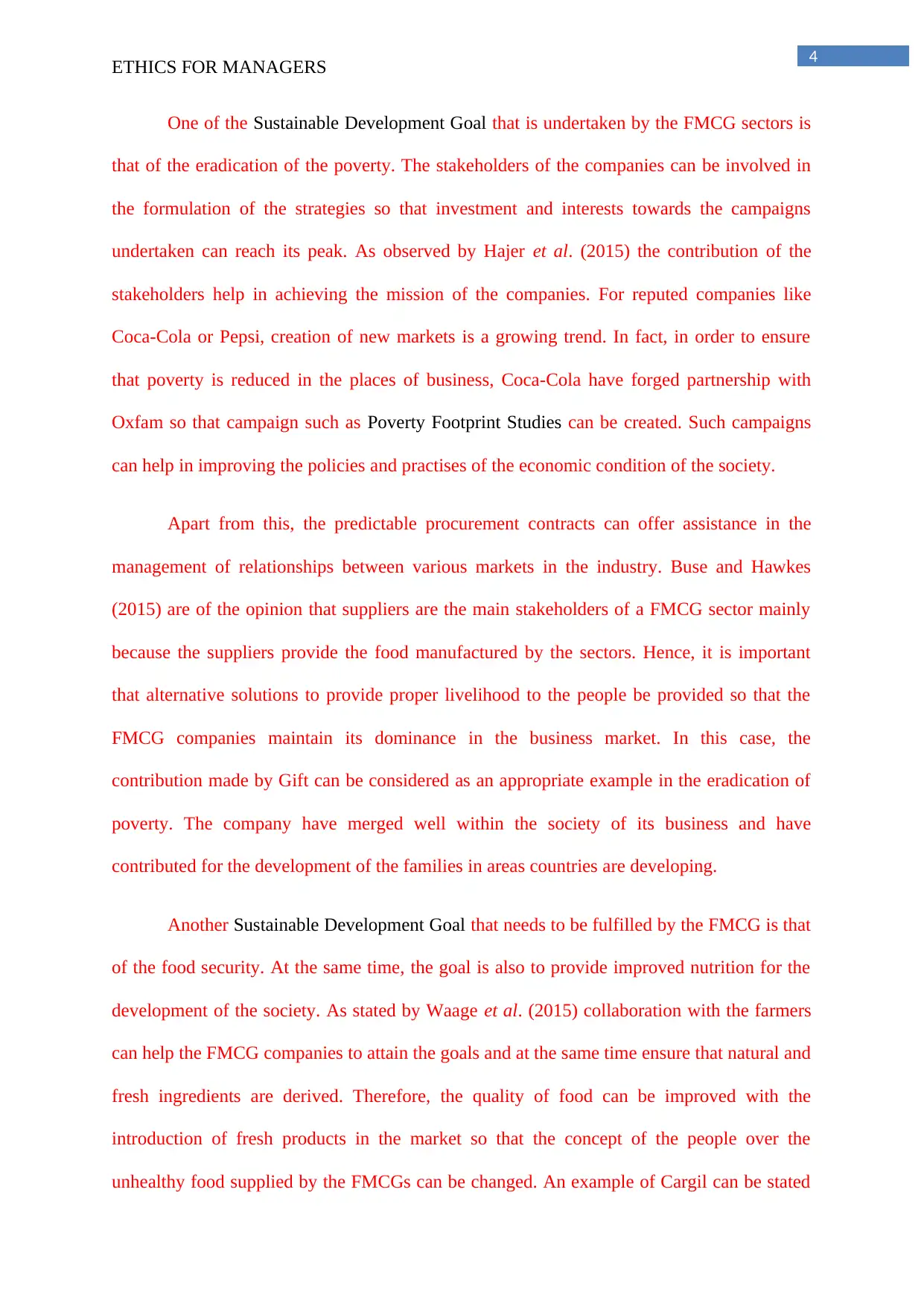
4
ETHICS FOR MANAGERS
One of the Sustainable Development Goal that is undertaken by the FMCG sectors is
that of the eradication of the poverty. The stakeholders of the companies can be involved in
the formulation of the strategies so that investment and interests towards the campaigns
undertaken can reach its peak. As observed by Hajer et al. (2015) the contribution of the
stakeholders help in achieving the mission of the companies. For reputed companies like
Coca-Cola or Pepsi, creation of new markets is a growing trend. In fact, in order to ensure
that poverty is reduced in the places of business, Coca-Cola have forged partnership with
Oxfam so that campaign such as Poverty Footprint Studies can be created. Such campaigns
can help in improving the policies and practises of the economic condition of the society.
Apart from this, the predictable procurement contracts can offer assistance in the
management of relationships between various markets in the industry. Buse and Hawkes
(2015) are of the opinion that suppliers are the main stakeholders of a FMCG sector mainly
because the suppliers provide the food manufactured by the sectors. Hence, it is important
that alternative solutions to provide proper livelihood to the people be provided so that the
FMCG companies maintain its dominance in the business market. In this case, the
contribution made by Gift can be considered as an appropriate example in the eradication of
poverty. The company have merged well within the society of its business and have
contributed for the development of the families in areas countries are developing.
Another Sustainable Development Goal that needs to be fulfilled by the FMCG is that
of the food security. At the same time, the goal is also to provide improved nutrition for the
development of the society. As stated by Waage et al. (2015) collaboration with the farmers
can help the FMCG companies to attain the goals and at the same time ensure that natural and
fresh ingredients are derived. Therefore, the quality of food can be improved with the
introduction of fresh products in the market so that the concept of the people over the
unhealthy food supplied by the FMCGs can be changed. An example of Cargil can be stated
ETHICS FOR MANAGERS
One of the Sustainable Development Goal that is undertaken by the FMCG sectors is
that of the eradication of the poverty. The stakeholders of the companies can be involved in
the formulation of the strategies so that investment and interests towards the campaigns
undertaken can reach its peak. As observed by Hajer et al. (2015) the contribution of the
stakeholders help in achieving the mission of the companies. For reputed companies like
Coca-Cola or Pepsi, creation of new markets is a growing trend. In fact, in order to ensure
that poverty is reduced in the places of business, Coca-Cola have forged partnership with
Oxfam so that campaign such as Poverty Footprint Studies can be created. Such campaigns
can help in improving the policies and practises of the economic condition of the society.
Apart from this, the predictable procurement contracts can offer assistance in the
management of relationships between various markets in the industry. Buse and Hawkes
(2015) are of the opinion that suppliers are the main stakeholders of a FMCG sector mainly
because the suppliers provide the food manufactured by the sectors. Hence, it is important
that alternative solutions to provide proper livelihood to the people be provided so that the
FMCG companies maintain its dominance in the business market. In this case, the
contribution made by Gift can be considered as an appropriate example in the eradication of
poverty. The company have merged well within the society of its business and have
contributed for the development of the families in areas countries are developing.
Another Sustainable Development Goal that needs to be fulfilled by the FMCG is that
of the food security. At the same time, the goal is also to provide improved nutrition for the
development of the society. As stated by Waage et al. (2015) collaboration with the farmers
can help the FMCG companies to attain the goals and at the same time ensure that natural and
fresh ingredients are derived. Therefore, the quality of food can be improved with the
introduction of fresh products in the market so that the concept of the people over the
unhealthy food supplied by the FMCGs can be changed. An example of Cargil can be stated
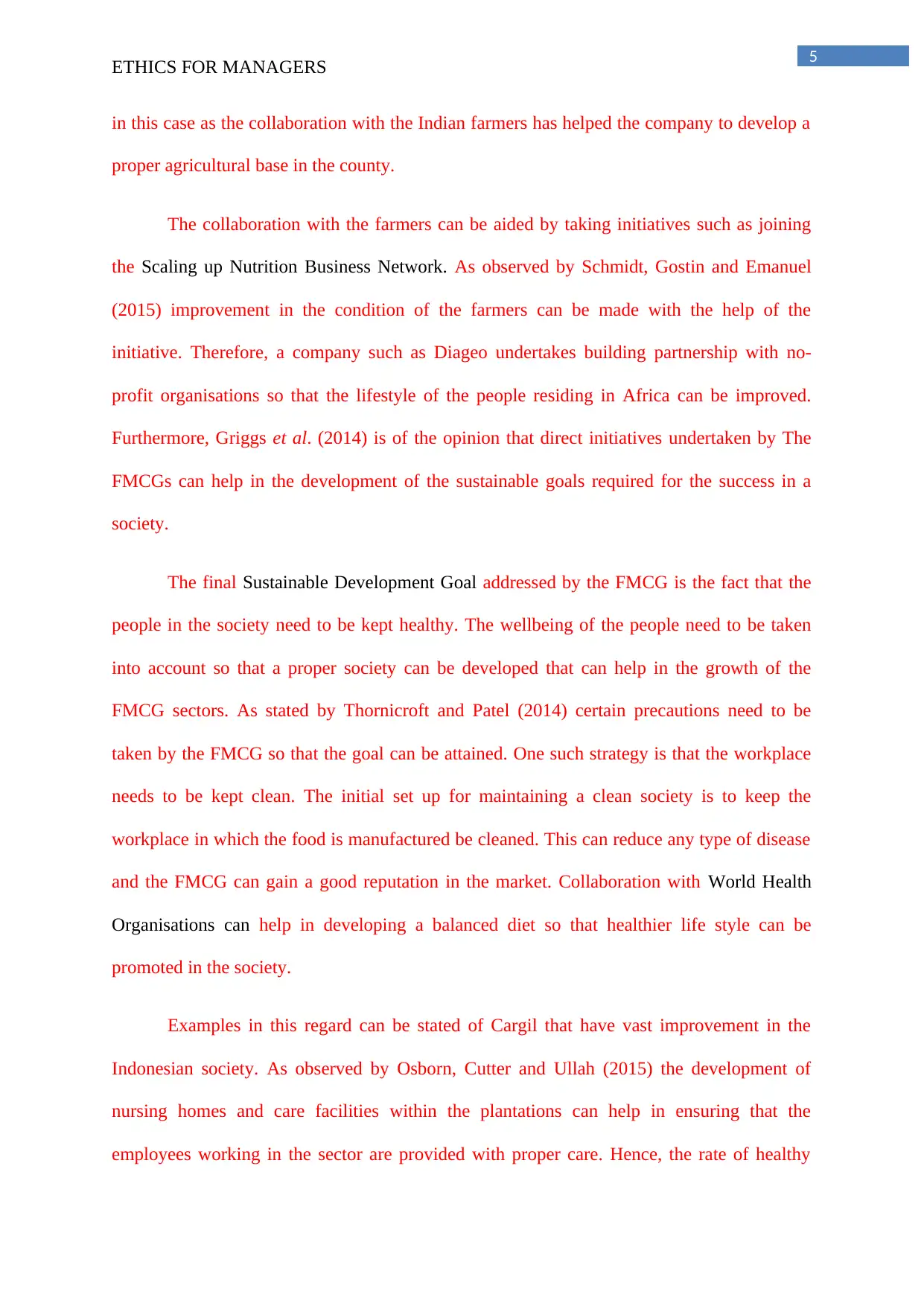
5
ETHICS FOR MANAGERS
in this case as the collaboration with the Indian farmers has helped the company to develop a
proper agricultural base in the county.
The collaboration with the farmers can be aided by taking initiatives such as joining
the Scaling up Nutrition Business Network. As observed by Schmidt, Gostin and Emanuel
(2015) improvement in the condition of the farmers can be made with the help of the
initiative. Therefore, a company such as Diageo undertakes building partnership with no-
profit organisations so that the lifestyle of the people residing in Africa can be improved.
Furthermore, Griggs et al. (2014) is of the opinion that direct initiatives undertaken by The
FMCGs can help in the development of the sustainable goals required for the success in a
society.
The final Sustainable Development Goal addressed by the FMCG is the fact that the
people in the society need to be kept healthy. The wellbeing of the people need to be taken
into account so that a proper society can be developed that can help in the growth of the
FMCG sectors. As stated by Thornicroft and Patel (2014) certain precautions need to be
taken by the FMCG so that the goal can be attained. One such strategy is that the workplace
needs to be kept clean. The initial set up for maintaining a clean society is to keep the
workplace in which the food is manufactured be cleaned. This can reduce any type of disease
and the FMCG can gain a good reputation in the market. Collaboration with World Health
Organisations can help in developing a balanced diet so that healthier life style can be
promoted in the society.
Examples in this regard can be stated of Cargil that have vast improvement in the
Indonesian society. As observed by Osborn, Cutter and Ullah (2015) the development of
nursing homes and care facilities within the plantations can help in ensuring that the
employees working in the sector are provided with proper care. Hence, the rate of healthy
ETHICS FOR MANAGERS
in this case as the collaboration with the Indian farmers has helped the company to develop a
proper agricultural base in the county.
The collaboration with the farmers can be aided by taking initiatives such as joining
the Scaling up Nutrition Business Network. As observed by Schmidt, Gostin and Emanuel
(2015) improvement in the condition of the farmers can be made with the help of the
initiative. Therefore, a company such as Diageo undertakes building partnership with no-
profit organisations so that the lifestyle of the people residing in Africa can be improved.
Furthermore, Griggs et al. (2014) is of the opinion that direct initiatives undertaken by The
FMCGs can help in the development of the sustainable goals required for the success in a
society.
The final Sustainable Development Goal addressed by the FMCG is the fact that the
people in the society need to be kept healthy. The wellbeing of the people need to be taken
into account so that a proper society can be developed that can help in the growth of the
FMCG sectors. As stated by Thornicroft and Patel (2014) certain precautions need to be
taken by the FMCG so that the goal can be attained. One such strategy is that the workplace
needs to be kept clean. The initial set up for maintaining a clean society is to keep the
workplace in which the food is manufactured be cleaned. This can reduce any type of disease
and the FMCG can gain a good reputation in the market. Collaboration with World Health
Organisations can help in developing a balanced diet so that healthier life style can be
promoted in the society.
Examples in this regard can be stated of Cargil that have vast improvement in the
Indonesian society. As observed by Osborn, Cutter and Ullah (2015) the development of
nursing homes and care facilities within the plantations can help in ensuring that the
employees working in the sector are provided with proper care. Hence, the rate of healthy
⊘ This is a preview!⊘
Do you want full access?
Subscribe today to unlock all pages.

Trusted by 1+ million students worldwide
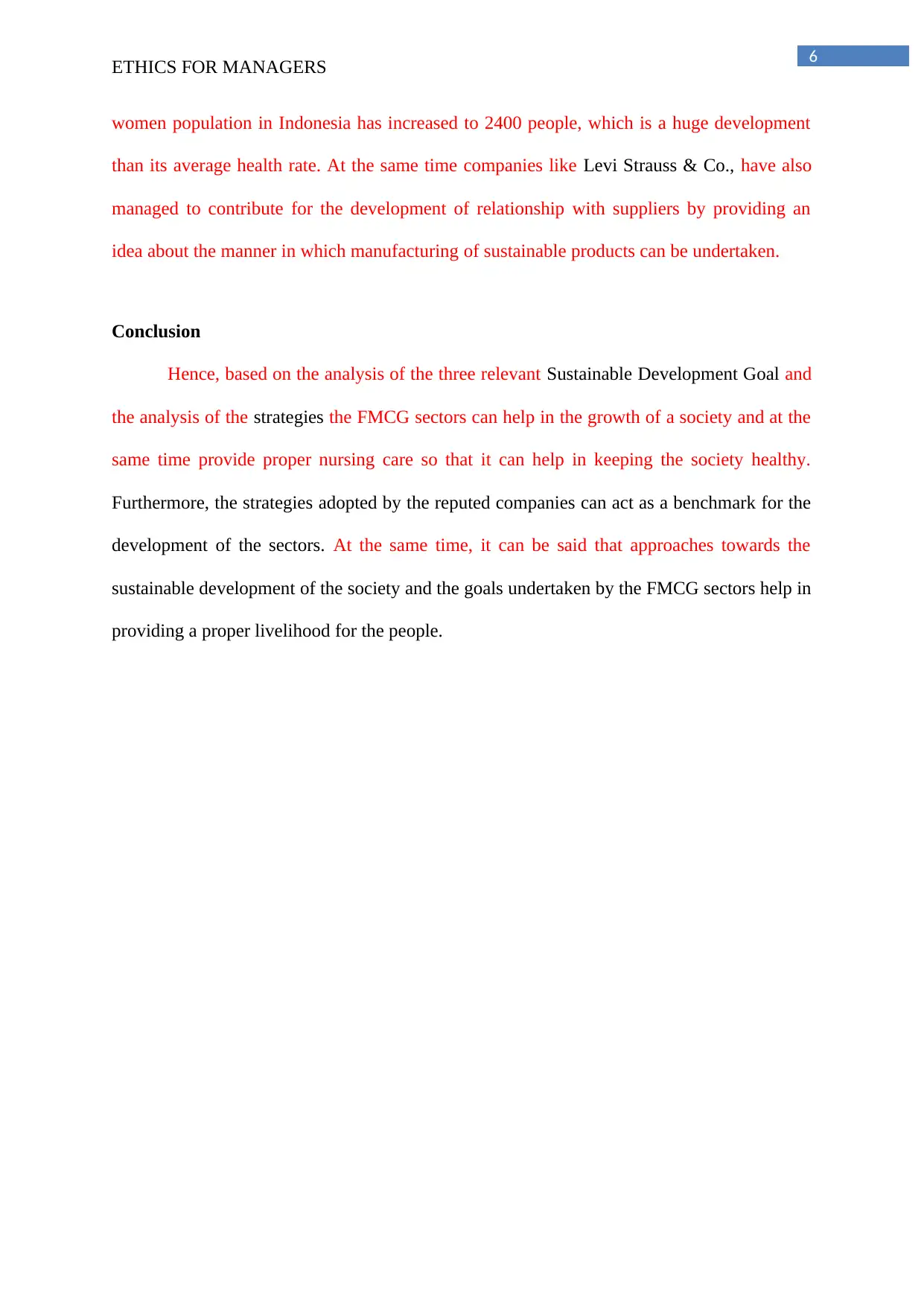
6
ETHICS FOR MANAGERS
women population in Indonesia has increased to 2400 people, which is a huge development
than its average health rate. At the same time companies like Levi Strauss & Co., have also
managed to contribute for the development of relationship with suppliers by providing an
idea about the manner in which manufacturing of sustainable products can be undertaken.
Conclusion
Hence, based on the analysis of the three relevant Sustainable Development Goal and
the analysis of the strategies the FMCG sectors can help in the growth of a society and at the
same time provide proper nursing care so that it can help in keeping the society healthy.
Furthermore, the strategies adopted by the reputed companies can act as a benchmark for the
development of the sectors. At the same time, it can be said that approaches towards the
sustainable development of the society and the goals undertaken by the FMCG sectors help in
providing a proper livelihood for the people.
ETHICS FOR MANAGERS
women population in Indonesia has increased to 2400 people, which is a huge development
than its average health rate. At the same time companies like Levi Strauss & Co., have also
managed to contribute for the development of relationship with suppliers by providing an
idea about the manner in which manufacturing of sustainable products can be undertaken.
Conclusion
Hence, based on the analysis of the three relevant Sustainable Development Goal and
the analysis of the strategies the FMCG sectors can help in the growth of a society and at the
same time provide proper nursing care so that it can help in keeping the society healthy.
Furthermore, the strategies adopted by the reputed companies can act as a benchmark for the
development of the sectors. At the same time, it can be said that approaches towards the
sustainable development of the society and the goals undertaken by the FMCG sectors help in
providing a proper livelihood for the people.
Paraphrase This Document
Need a fresh take? Get an instant paraphrase of this document with our AI Paraphraser
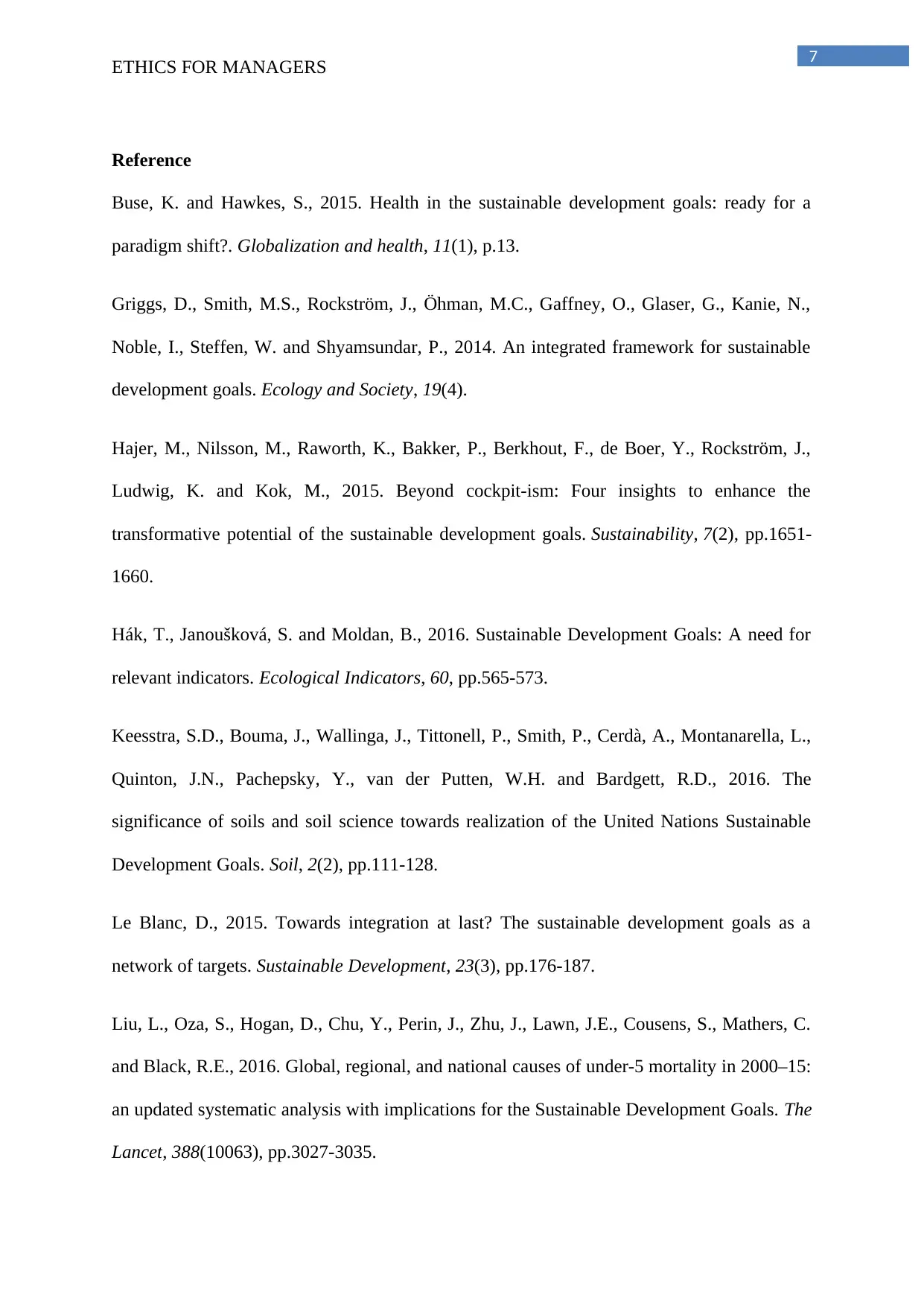
7
ETHICS FOR MANAGERS
Reference
Buse, K. and Hawkes, S., 2015. Health in the sustainable development goals: ready for a
paradigm shift?. Globalization and health, 11(1), p.13.
Griggs, D., Smith, M.S., Rockström, J., Öhman, M.C., Gaffney, O., Glaser, G., Kanie, N.,
Noble, I., Steffen, W. and Shyamsundar, P., 2014. An integrated framework for sustainable
development goals. Ecology and Society, 19(4).
Hajer, M., Nilsson, M., Raworth, K., Bakker, P., Berkhout, F., de Boer, Y., Rockström, J.,
Ludwig, K. and Kok, M., 2015. Beyond cockpit-ism: Four insights to enhance the
transformative potential of the sustainable development goals. Sustainability, 7(2), pp.1651-
1660.
Hák, T., Janoušková, S. and Moldan, B., 2016. Sustainable Development Goals: A need for
relevant indicators. Ecological Indicators, 60, pp.565-573.
Keesstra, S.D., Bouma, J., Wallinga, J., Tittonell, P., Smith, P., Cerdà, A., Montanarella, L.,
Quinton, J.N., Pachepsky, Y., van der Putten, W.H. and Bardgett, R.D., 2016. The
significance of soils and soil science towards realization of the United Nations Sustainable
Development Goals. Soil, 2(2), pp.111-128.
Le Blanc, D., 2015. Towards integration at last? The sustainable development goals as a
network of targets. Sustainable Development, 23(3), pp.176-187.
Liu, L., Oza, S., Hogan, D., Chu, Y., Perin, J., Zhu, J., Lawn, J.E., Cousens, S., Mathers, C.
and Black, R.E., 2016. Global, regional, and national causes of under-5 mortality in 2000–15:
an updated systematic analysis with implications for the Sustainable Development Goals. The
Lancet, 388(10063), pp.3027-3035.
ETHICS FOR MANAGERS
Reference
Buse, K. and Hawkes, S., 2015. Health in the sustainable development goals: ready for a
paradigm shift?. Globalization and health, 11(1), p.13.
Griggs, D., Smith, M.S., Rockström, J., Öhman, M.C., Gaffney, O., Glaser, G., Kanie, N.,
Noble, I., Steffen, W. and Shyamsundar, P., 2014. An integrated framework for sustainable
development goals. Ecology and Society, 19(4).
Hajer, M., Nilsson, M., Raworth, K., Bakker, P., Berkhout, F., de Boer, Y., Rockström, J.,
Ludwig, K. and Kok, M., 2015. Beyond cockpit-ism: Four insights to enhance the
transformative potential of the sustainable development goals. Sustainability, 7(2), pp.1651-
1660.
Hák, T., Janoušková, S. and Moldan, B., 2016. Sustainable Development Goals: A need for
relevant indicators. Ecological Indicators, 60, pp.565-573.
Keesstra, S.D., Bouma, J., Wallinga, J., Tittonell, P., Smith, P., Cerdà, A., Montanarella, L.,
Quinton, J.N., Pachepsky, Y., van der Putten, W.H. and Bardgett, R.D., 2016. The
significance of soils and soil science towards realization of the United Nations Sustainable
Development Goals. Soil, 2(2), pp.111-128.
Le Blanc, D., 2015. Towards integration at last? The sustainable development goals as a
network of targets. Sustainable Development, 23(3), pp.176-187.
Liu, L., Oza, S., Hogan, D., Chu, Y., Perin, J., Zhu, J., Lawn, J.E., Cousens, S., Mathers, C.
and Black, R.E., 2016. Global, regional, and national causes of under-5 mortality in 2000–15:
an updated systematic analysis with implications for the Sustainable Development Goals. The
Lancet, 388(10063), pp.3027-3035.
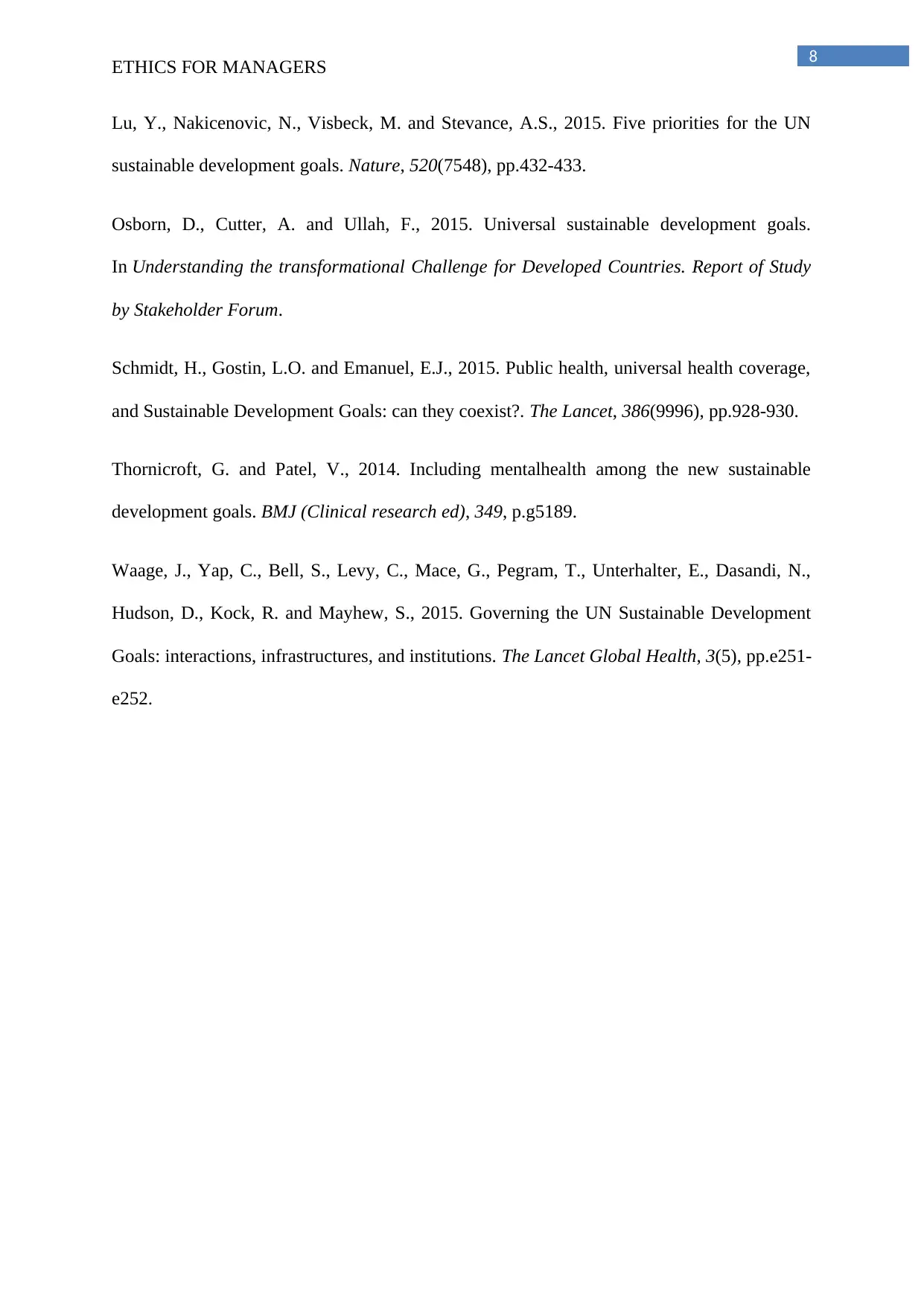
8
ETHICS FOR MANAGERS
Lu, Y., Nakicenovic, N., Visbeck, M. and Stevance, A.S., 2015. Five priorities for the UN
sustainable development goals. Nature, 520(7548), pp.432-433.
Osborn, D., Cutter, A. and Ullah, F., 2015. Universal sustainable development goals.
In Understanding the transformational Challenge for Developed Countries. Report of Study
by Stakeholder Forum.
Schmidt, H., Gostin, L.O. and Emanuel, E.J., 2015. Public health, universal health coverage,
and Sustainable Development Goals: can they coexist?. The Lancet, 386(9996), pp.928-930.
Thornicroft, G. and Patel, V., 2014. Including mentalhealth among the new sustainable
development goals. BMJ (Clinical research ed), 349, p.g5189.
Waage, J., Yap, C., Bell, S., Levy, C., Mace, G., Pegram, T., Unterhalter, E., Dasandi, N.,
Hudson, D., Kock, R. and Mayhew, S., 2015. Governing the UN Sustainable Development
Goals: interactions, infrastructures, and institutions. The Lancet Global Health, 3(5), pp.e251-
e252.
ETHICS FOR MANAGERS
Lu, Y., Nakicenovic, N., Visbeck, M. and Stevance, A.S., 2015. Five priorities for the UN
sustainable development goals. Nature, 520(7548), pp.432-433.
Osborn, D., Cutter, A. and Ullah, F., 2015. Universal sustainable development goals.
In Understanding the transformational Challenge for Developed Countries. Report of Study
by Stakeholder Forum.
Schmidt, H., Gostin, L.O. and Emanuel, E.J., 2015. Public health, universal health coverage,
and Sustainable Development Goals: can they coexist?. The Lancet, 386(9996), pp.928-930.
Thornicroft, G. and Patel, V., 2014. Including mentalhealth among the new sustainable
development goals. BMJ (Clinical research ed), 349, p.g5189.
Waage, J., Yap, C., Bell, S., Levy, C., Mace, G., Pegram, T., Unterhalter, E., Dasandi, N.,
Hudson, D., Kock, R. and Mayhew, S., 2015. Governing the UN Sustainable Development
Goals: interactions, infrastructures, and institutions. The Lancet Global Health, 3(5), pp.e251-
e252.
⊘ This is a preview!⊘
Do you want full access?
Subscribe today to unlock all pages.

Trusted by 1+ million students worldwide
1 out of 9
Related Documents
Your All-in-One AI-Powered Toolkit for Academic Success.
+13062052269
info@desklib.com
Available 24*7 on WhatsApp / Email
![[object Object]](/_next/static/media/star-bottom.7253800d.svg)
Unlock your academic potential
Copyright © 2020–2026 A2Z Services. All Rights Reserved. Developed and managed by ZUCOL.





